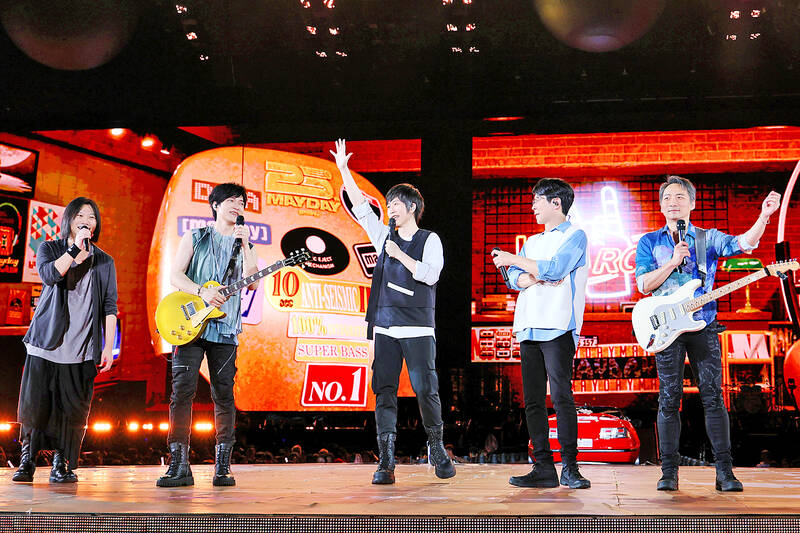Chinese officials have cleared popular Taiwanese band Mayday (五月天) of lip-synching allegations after finding that the group did nothing illegal during a concert last year, Chinese-language media said.
China's social media users accused Mayday of lip-synching after the band performed in Shanghai as part of their global tour on May 16 last year.
The allegation triggered an Internet storm, with China's state-run People’s Daily publishing a column at the time urging the government to punish musicians for fake singing without naming Mayday.

Photo courtesy of B’in Music
B’in Music, Mayday’s record label at the time, disputed the accusation as a “malicious attack and slanderous rumor.”
China's Nanjing-based Yangtse Evening Post yesterday reported that the Shanghai Municipal Administration of Culture and Tourism, in response to its inquiry on the result of its probe, said its law enforcement arm surveilled concerts as a matter of routine and did not uncover any evidence of illegal activity.
Mayday revealed on April 26 that it would go on another tour to mark its 25th anniversary, with concerts planned at the Beijing National Stadium from this month to early next month.
The announcement caused a splash on Sina Weibo, China’s main social media platform. A promotional image released by the B’in Music said all tickets to the concerts in Beijing were sold out.

Taiwan has received more than US$70 million in royalties as of the end of last year from developing the F-16V jet as countries worldwide purchase or upgrade to this popular model, government and military officials said on Saturday. Taiwan funded the development of the F-16V jet and ended up the sole investor as other countries withdrew from the program. Now the F-16V is increasingly popular and countries must pay Taiwan a percentage in royalties when they purchase new F-16V aircraft or upgrade older F-16 models. The next five years are expected to be the peak for these royalties, with Taiwan potentially earning

STAY IN YOUR LANE: As the US and Israel attack Iran, the ministry has warned China not to overstep by including Taiwanese citizens in its evacuation orders The Ministry of Foreign Affairs (MOFA) yesterday rebuked a statement by China’s embassy in Israel that it would evacuate Taiwanese holders of Chinese travel documents from Israel amid the latter’s escalating conflict with Iran. Tensions have risen across the Middle East in the wake of US and Israeli airstrikes on Iran beginning Saturday. China subsequently issued an evacuation notice for its citizens. In a news release, the Chinese embassy in Israel said holders of “Taiwan compatriot permits (台胞證)” issued to Taiwanese nationals by Chinese authorities for travel to China — could register for evacuation to Egypt. In Taipei, the ministry yesterday said Taiwan

Taiwan is awaiting official notification from the US regarding the status of the Agreement on Reciprocal Trade (ART) after the US Supreme Court ruled US President Donald Trump's global tariffs unconstitutional. Speaking to reporters before a legislative hearing today, Premier Cho Jung-tai (卓榮泰) said that Taiwan's negotiation team remains focused on ensuring that the bilateral trade deal remains intact despite the legal challenge to Trump's tariff policy. "The US has pledged to notify its trade partners once the subsequent administrative and legal processes are finalized, and that certainly includes Taiwan," Cho said when asked about opposition parties’ doubts that the ART was

If China chose to invade Taiwan tomorrow, it would only have to sever three undersea fiber-optic cable clusters to cause a data blackout, Jason Hsu (許毓仁), a senior fellow at the Hudson Institute and former Chinese Nationalist Party (KMT) legislator, told a US security panel yesterday. In a Taiwan contingency, cable disruption would be one of the earliest preinvasion actions and the signal that escalation had begun, he said, adding that Taiwan’s current cable repair capabilities are insufficient. The US-China Economic and Security Review Commission (USCC) yesterday held a hearing on US-China Competition Under the Sea, with Hsu speaking on